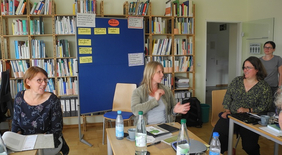The joint project on the regiosöl approach aims at better assessing and renumerating the regional social-ecological services (SÖL) of organic farming. Since the first project meeting in March still had to take place virtually, the project team was happy to get to know each other personally at the second meeting on September 2. A representative of the 'Federal Program Organic Farming and Other Forms of Sustainable Agriculture' (BÖLN) on behalf of which the project is implemented, could, connected online, consider and answer important questions.
The meetings' focus was on the results of the suitability test of existing approaches to the assessment and communication of socio-ecological achievements of organic agriculture. The examination is the basis for identifying gaps in existing approaches, especially with regard to regional and social benefits of organic agriculture, and to gain insights for the development of the regiosöl approach.
Gaps exist in almost all approaches, especially at the regional level. In addition, social services, e.g. in the areas of landscape character and cultural heritage, recreation and rural vitality are only partially covered. In the coming project meetings, the aim is to define the service areas of the regiosöl approach. A focus group, which will meet personally for the first time at the end of October, will accompany the project team in an advisory capacity during the project orientation. On November 25th, further experts, e.g. for the development of recording approaches, from science or representatives from the organic associations will be involved in the project in a national workshop.
Contact persons at IfLS: Simone Sterly (sterly[at]ifls.de) and Dr. Marie Sophie Schmidt (schmidt[at]ifls.de)

![[Translate to English:] [Translate to English:]](/fileadmin/_processed_/9/a/csm_regios%C3%B6l_Logo_final_nocaps_544b117dd1.jpg)